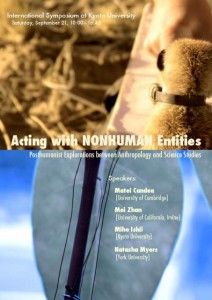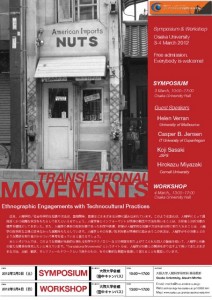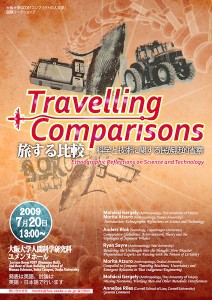ACTING WITH NONHUMAN ENTITIES
Posthumanist Explorations between Anthropology and Science Studies
International Conference and Workshop at Kyoto University
 Date: March 3-4, 2012 (Saturday and Sunday)
Date: March 3-4, 2012 (Saturday and Sunday)
Venue: Kyoto University, Institute for Research in Humanities (Main Bldg., Conference Room)
access map: http://www.zinbun.kyoto-u.ac.jp/e/institute/access-institute/access_e.htm
Open to public. Admission Free. No registration is required.
SYMPOSIUM ABSTRACT
Whereas artifacts, animals and all sorts of otherworldly creatures have long occupied the attention of anthropologists, recent encounters with science and technology studies have stimulated a novel interest in ecological thinking. Part of the impetus for this research comes from a shared critical stance towards the anthropocentric bias of social research. Another important issue central to these debates has been a growing emphasis on innovation at the ethnographic level. Posthumanist approaches call for a closer attention to nonhuman entities by exploring their role in what constitutes the senses, persons, worlds, etc. This conference will reflect on these conceptual and methodological currents in anthropology and beyond with the participation of scholars from diverse backgrounds and fields of study. Some of the key concerns and question we shall focus on are: What disciplinary boundaries have to be crossed or permeated to reveal otherwise unattended links between human and nonhuman ways of acting in the world? What are the distinguishing features of these analytic experimentations when compared to earlier work in ecological and cultural anthropology? How do the variety of posthumanist trends, from actor-network theory to multispecies ethnography and ontological anthropology, differ from and relate to each other? We hope to address these questions by both discussing new theoretical challenges and presenting diverse ethnographic cases relevant to the ongoing transformations of the world—a world, which is populated with humans and animate non-humans alongside techniques, and anthropologists who try to understand them.
PARTICIPANTS
Guest Speakers
Matei Candea (University of Cambridge)
Miho Ishii (Kyoto University)
Natasha Myers (York University)
Mei Zhan (University of California, Irvine)
Workshop Presenters
Moe Nakazora (JSPS/Kyoto University)
Lea Schick (IT University, Copenhagen)
Wakana Suzuki (Osaka University)
PROGRAM
Day 1 (Graduate Workshop)
13:30 Introduction
13:45 The Care of the Cells: Body, Care and Affect
Wakana Suzuki (Osaka University)
Comments by Natasha Myers (York University)
14:45 (Coffee Break)
14:55 Infrastructuring Smart Grid Environments: Technological Artifacts, Subjectpositions and ‘Natures’
Lea Schick (IT University, Copenhagen)
Comments by Mei Zhan (University of California, Irvine)
15:55 (Coffee Break)
16:05 Pure Gifts for Future Benefit? Giving Form to Subject in the Biodiversity Databasing Project in India
Moe Nakazora (JSPS/Kyoto University)
Comments by Matei Candea (University of Cambridge)
17:15 Closing comments by Paul Hansen (Tsukuba University)
Day 2 (International Symposium)
10:00 Moderator/Introductory Remarks by Gergely Mohácsi (Osaka University)
10:15 Excitable Tissues: Vocalities and Temporalities in Botanical Experiments
Natasha Myers (York University)
11:15 (Coffee Break)
11:30 Disharmony Undivided: Thinking, Doing and Being Posthuman through Daosim’
Mei Zhan (University of California, Irvine)
12:30 (Lunch Break)
13:30 The Ecology of Transaction: Dividual Persons, Spirits, and Machinery in the Special Economic Zone in South India
Miho Ishii (Kyoto University)
14:30 Not feeding (or eating) meerkats
Matei Candea (University of Cambridge)
15:30 (Coffee Break)
15:45 General Discussion
For further details contact:
Atsuro Morita (Osaka University) morita@hus.osaka-u.ac.jp, or
Gergely Mohacsi (Keio University) mohacska@z3.keio.jp

